Electric vehicle opinions
The UK is gradually rolling out green initiatives and taking action against climate change, however, there has been a lot of controversy around these topics, and people have a wide range of views
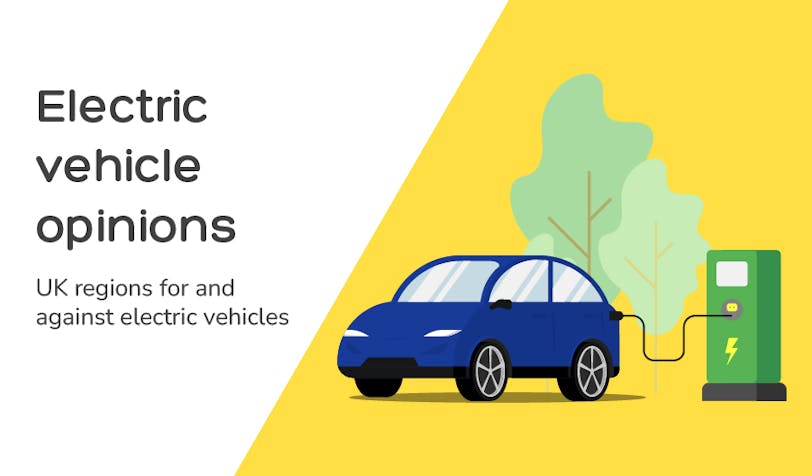
UK regions for and against electric vehicles
The UK is gradually rolling out green initiatives and taking action against climate change, most notably, the expansion of Ultra-Low Emission Zones in London. Additionally, from 2035, new petrol and diesel cars will no longer be sold in the UK. However, there has been a lot of controversy around these topics, and people have a wide range of views.
There are increasingly more accessible ways to own an electric vehicle, such as salary sacrifice programs. These workplace schemes allow employees to allocate a portion of their pre-tax income toward leasing or purchasing an electric car. Additionally, the convenience of electric vehicle ownership is increasing with the expansion of EV charging stations. This increase in charging stations should also help alleviate concerns around range anxiety.
What is the sentiment around electric vehicle ownership and adoption around the UK?
Our experts at DriveElectric have the answers. Having surveyed 2,000 people across the UK, we have found out the proportion of electric vehicle owners, whether people would buy or lease an electric vehicle and the main reasons why people are apprehensive about them.
Who is most likely to drive an electric vehicle?

Over the last few years, electric cars have been registered faster than petrol and diesel vehicles. This trend will likely continue, with new petrol and diesel vehicle sales being ruled out by 2035.
We found just over a quarter (26.4%) of the Brits we surveyed drove electric cars. People aged between 25 and 34 led the way, with almost half (46.9%) driving an electric vehicle. People aged 65 and over are the age group least likely to drive an electric car, with nine in ten (90.5%) reporting they don’t drive an electric vehicle.
Men were the most likely to drive electric vehicles, with almost a third (30.3%) reporting so. This compares to a smaller under a quarter (23.4%) of women who drive electric cars.
Manchester comes out on top in terms of cities in the UK with the highest proportion of electric vehicle drivers. Almost half of (44.5%) of Mancunians drive an electric vehicle. London comes in second, with over a third (34.3%) of people driving an electric vehicle, and Nottingham comes in third.

Cardiff is the city that has the lowest proportion of electric vehicle ownership, with 87.7% of people reporting they do not drive an electric vehicle.
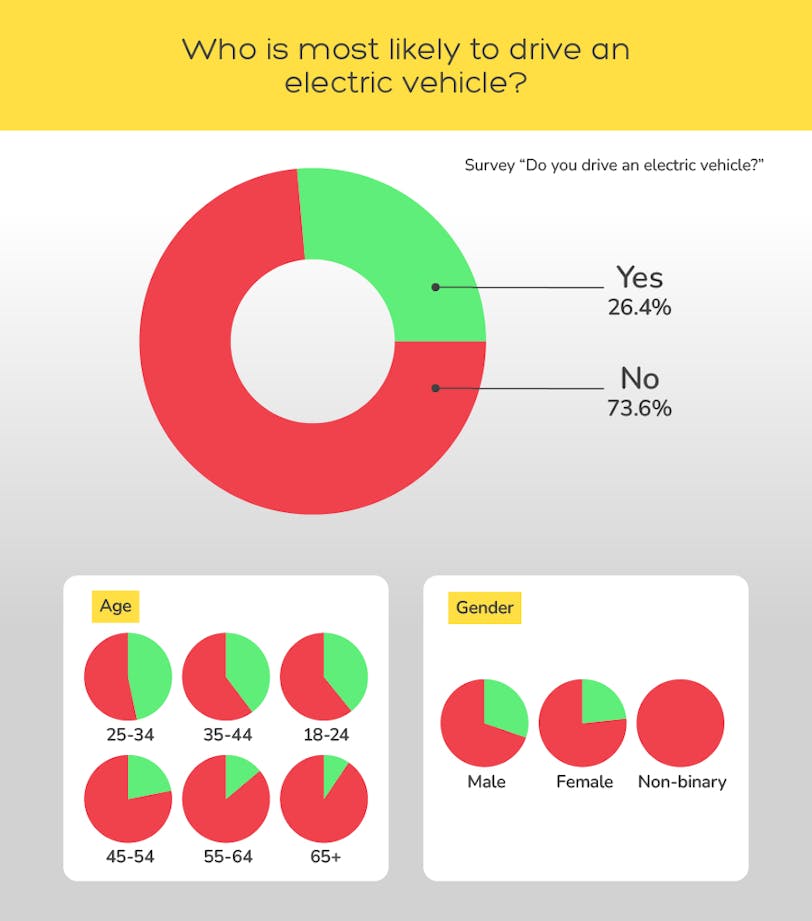
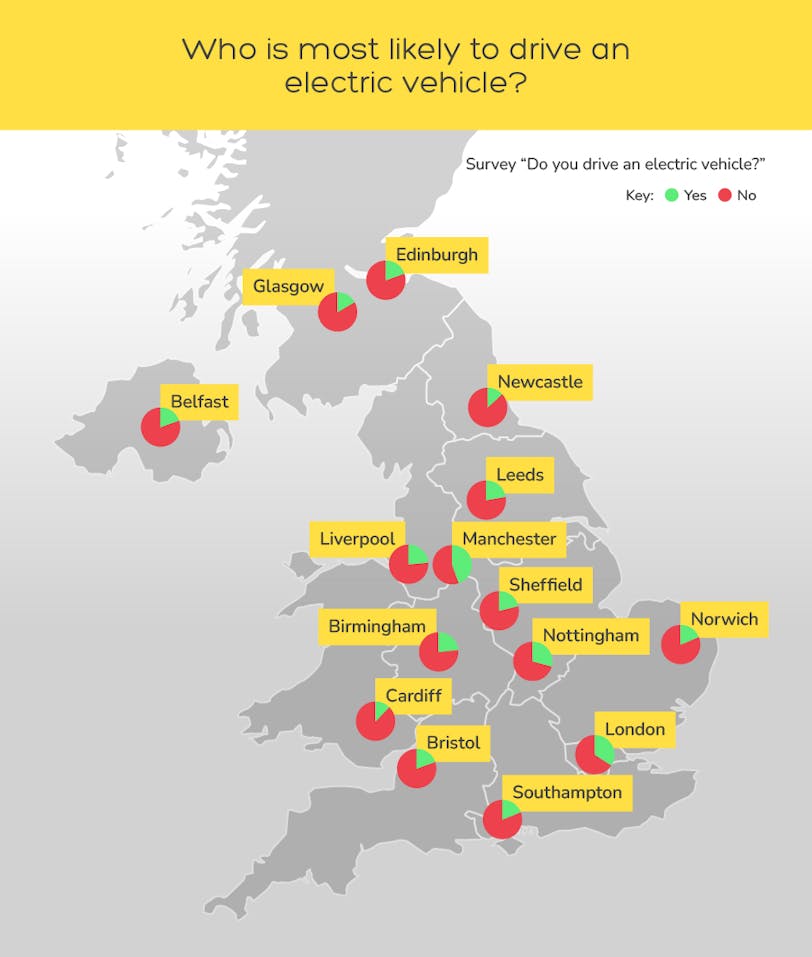
Who is most likely to buy an electric vehicle?
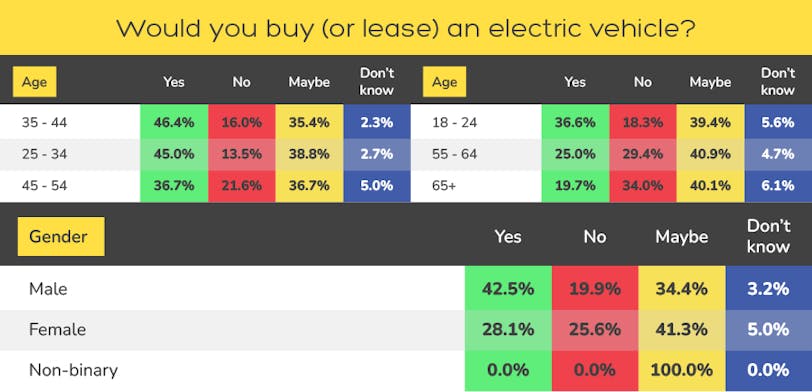
When asked if they would buy or lease an electric vehicle, just over one-third (34.5%) of Brits said they would, almost two-fifths (38.3%) said “maybe”, and 4.2% admitted they didn’t know, indicating some uncertainty around electric vehicle ownership. And less than a quarter (23.1%) of respondents said they wouldn’t own an electric vehicle.
Over two-fifths (42.5%) of male respondents said they would buy an electric vehicle, and under a third (28.1%) of female respondents said they would. A further 41.3% of female Brits said they would consider it.
People aged 35 to 44 are most enthusiastic about potentially buying an electric vehicle, with 46.4% saying as much. Brits aged 65 and over were the most apprehensive about electric vehicle ownership, with just over a third (34.0%) saying they would not buy one.
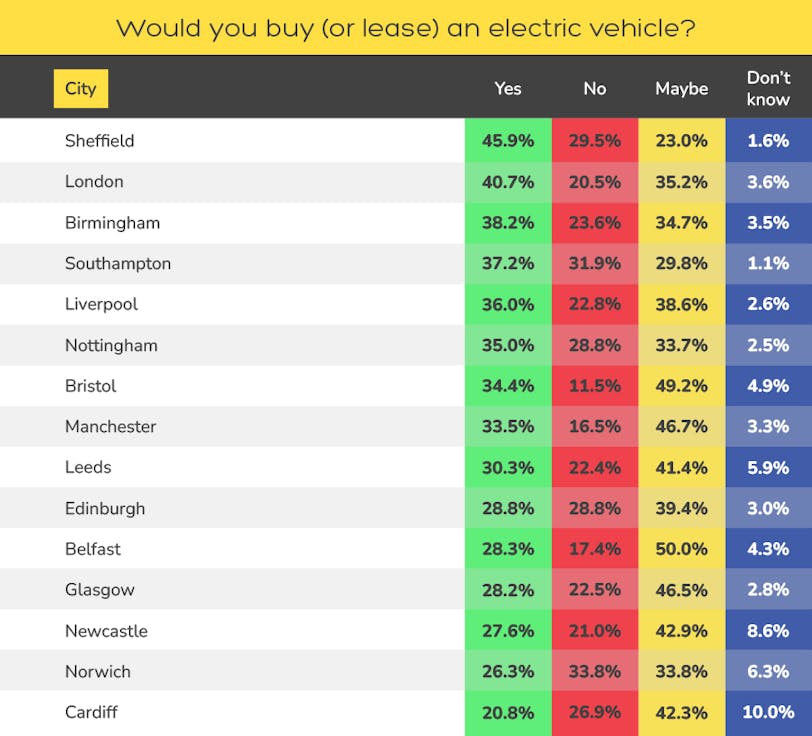
Residents of Sheffield had the highest proportion of positive responses, with over two-fifths (45.9%) of people in the city saying that they would buy an electric vehicle. London came in as a close second, with just over two-fifths (40.7%) of respondents responding positively to this question. Norwich had the most negative responses, with over a third (33.8%) of people surveyed saying they would not consider buying an electric vehicle.
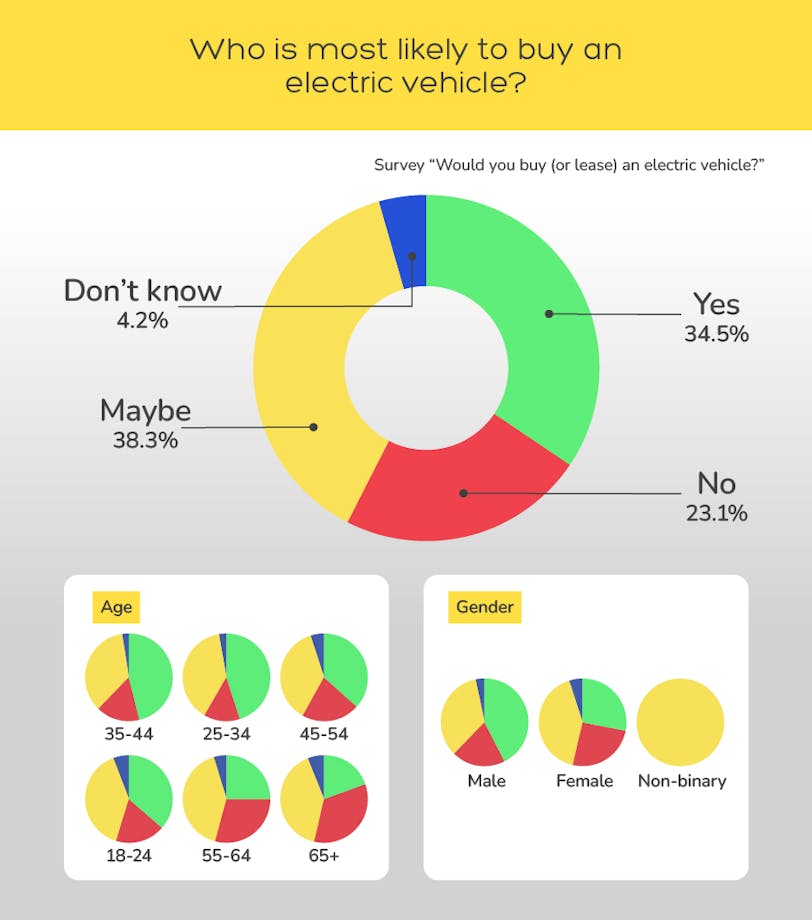
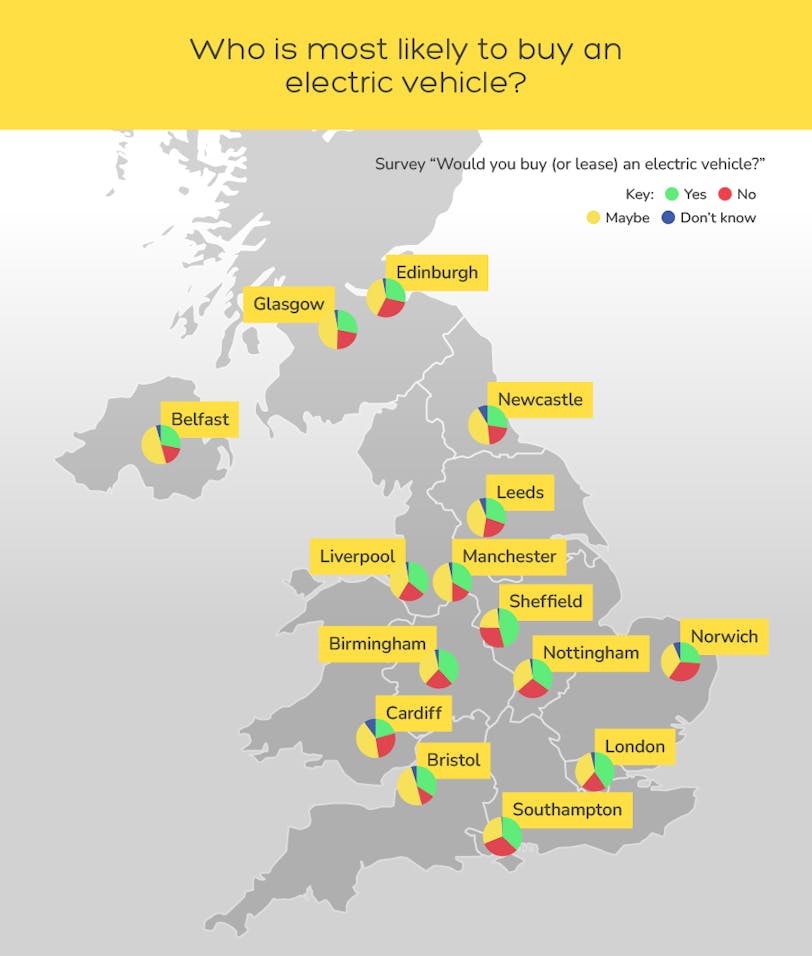
Why would many consumers not buy an electric vehicle?
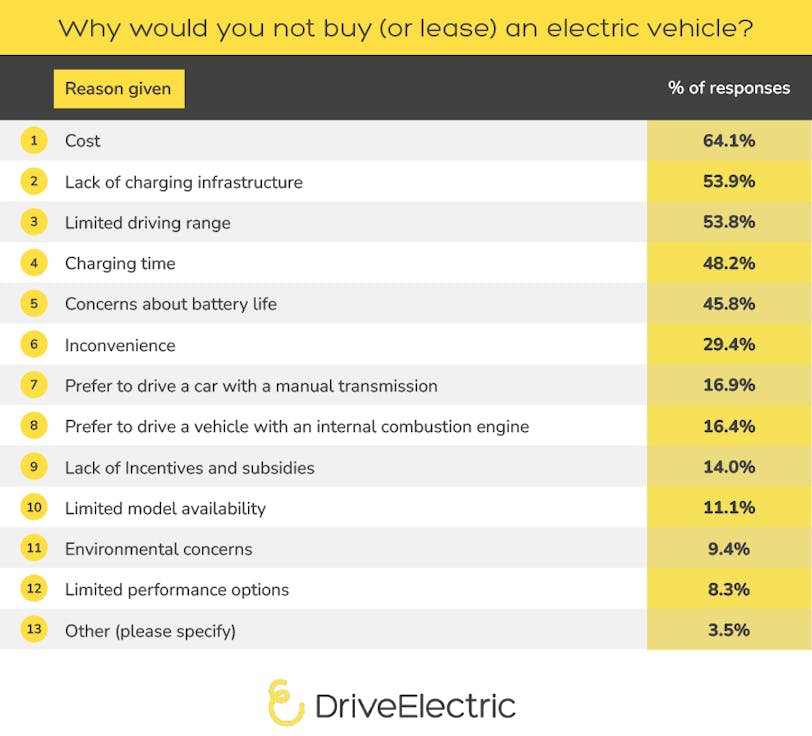
The previous questions showed a willingness across the UK to drive and adapt to using electric vehicles; however, the responses also displayed that many people remain uncertain. When we asked respondents about their reservations towards electric cars, the most commonly cited reason for not purchasing was the cost, with almost two-thirds (64,1%) of respondents put off by this. Since electric vehicles are produced on a smaller scale to a smaller market, they tend to sell for higher prices than petrol and diesel cars. However, the running costs can be cheaper than with ICE vehicles, as can the cost of taxing and insuring electric cars.
Charging infrastructure and driving range were also cited as some of the top concerns around electric vehicle ownership. Over half (53.9%) of respondents reported they would consider this when purchasing an electric car. Admittedly, the government's expansion of electric vehicle charging points could be faster. Rishi Sunak unveiled a funding pot which has yet to be opened to bids. Expanding the electric vehicle charging network in the UK would greatly alleviate the fear of range anxiety. A similar proportion of respondents (53.8%) cited limited driving range as a primary concern.
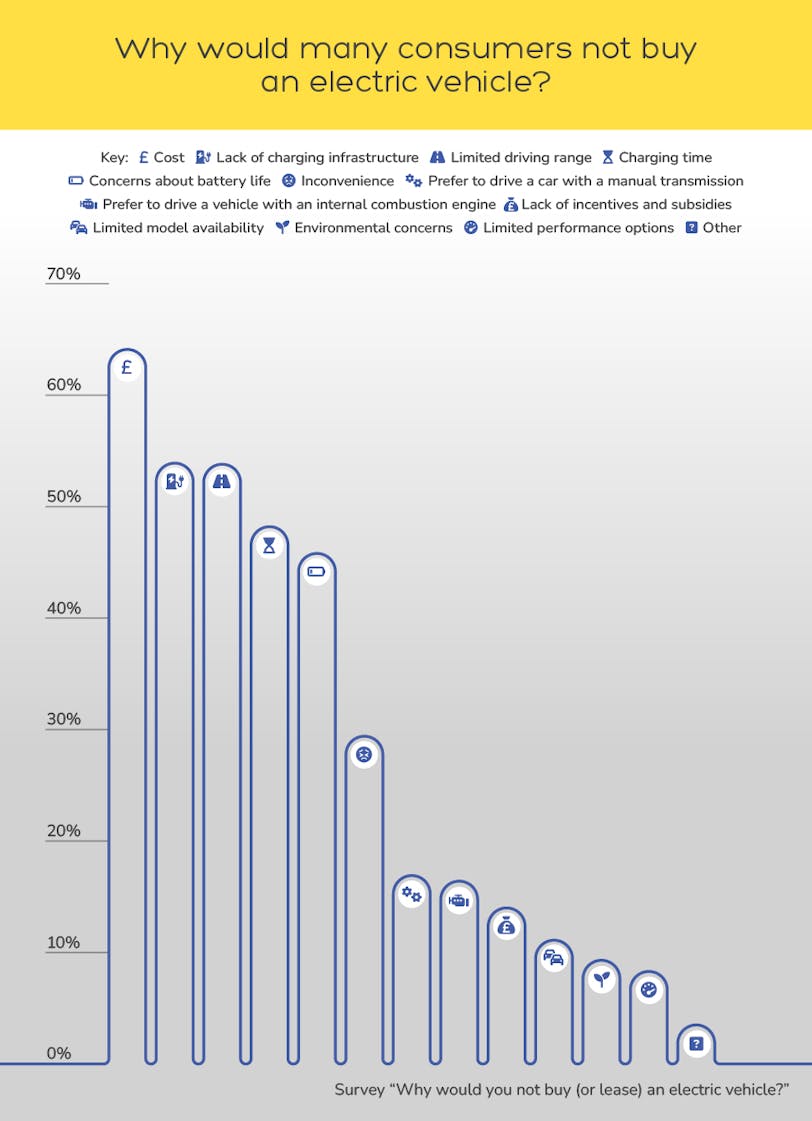
FAQ: Most common questions about electric vehicle ownership answered
1. How do electric vehicles contribute to reducing carbon emissions?
Arguably, the main selling point for electric vehicles is that they are better for the environment. But how exactly are they better?
Electric motors emit zero tailpipe emissions, unlike petrol and diesel engines, which use fossil fuels and emit pollutants into the air. Due to their electric battery, electric vehicles don’t emit pollutants such as carbon dioxide and nitrogen oxides. This lack of emissions can ultimately lead to better air quality, especially in urban areas.
Additionally, if the electricity used to power and charge the vehicle comes from green and renewable sources, such as solar panels, that further increases your positive environmental impact.
2. Can I use an electric vehicle for long-distance travel?
With range anxiety being a key concern for prospective electric vehicle owners, this question comes up quite often. Yes, you can use an electric vehicle for long-distance journeys. However, there are some considerations you need to make before doing so.
You should properly plan your route and identify any charging points to ensure enough charging infrastructure for your journey. You should monitor your battery level and avoid letting it fall too low to prevent any mishaps. It would also be essential to know and understand the operable range of your particular model. Cold and hot weather conditions can also affect your electric vehicle's capacity.
There are also some manufacturers, such as Tesla, that offer long-range models for their cars. This means they have a higher battery capacity, better energy efficiency, and, as such, a longer operable range.
3. How does the total cost of ownership compare to traditional vehicles?
The most significant barrier to entry for electric vehicles has always been the higher upfront costs. Electric cars are manufactured on a smaller scale and are less common on used markets, meaning they are often sold for higher prices than petrol and diesel vehicles.
Typically, as of 2022, fully charging a 60kW electric vehicle at home would cost around £15 and give you a 200-mile range. Whereas, for a full tank of gasoline, it would likely cost more than £100 for a range between 200 and 400 miles, depending on the model of car. As such, the actual running costs tend to be cheaper. Additionally, your road tax on an electric car would amount to zero, as tax is based on CO2 emissions, which electric vehicles don't produce.
4. What maintenance is required for electric vehicles?
Just as ICE (Internal Combustion Engine) vehicles need servicing and maintenance, so do electric cars. How often they need servicing depends on the model and manufacturer guidelines, though usually it’s around every once a year or 18,000 miles, whichever comes first.
Tyres, brakes, suspension and coolant all need servicing, just like on petrol and diesel vehicles. The electric battery, motors and charging connections must also be checked regularly. However, servicing and maintenance on electric vehicles are usually cheaper than their traditional counterparts. A study by Go Low Ultra cited that electric vehicles can cost up to 23% less over a three-year period.
5. How can I install a home charging point? And are there government grants?
Various companies sell and install home charging points for your electric vehicle. However, it is essential to research to find the most reputable dealer. Check the electric vehicle charger power rating and ensure it matches your model.
There is also a government grant in the UK for people wanting to install home electric vehicle chargers. However, to be eligible for this grant, you must use a provider approved by the Office for Low Emission Vehicles. You must also have dedicated off-street parking and an eligible vehicle. Installers approved by the Office for Low Emission Vehicles can be found on the government website.
6. Are electric vehicles at a high risk of catching fire?
The myth that electric vehicles are at a higher risk of catching fire than ICE vehicles is simply untrue. This idea originated as a potential increased fire danger can occur once a battery begins to burn or becomes damaged.
However, a Swedish Civil Contingencies Agency study has revealed EVs are 20 times less likely to catch fire than petrol and diesel vehicles. Keeping on top of maintenance for your electric car can help extend the lifespan of car batteries and avoid breakdowns.
Methodology
We surveyed 2,000 people in the UK via TLF Panel Research surveys to determine the sentiment around electric vehicle ownership in the UK.
We then used ChatGPT to determine the commonly asked questions about EV ownership in the UK. We then provided answers for each one, in some cases referencing sites such as the RAC, British Gas and the Gov.uk.